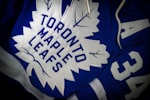"History is written by the victors." - Winston Churchill
(Not everything I write will come from Holzman and Nieforth's Deceptions and Doublecross: How the NHL Conquered Hockey - actually, quite a bit doesn't - but it's a good bet that this book will have influenced it. Seriously - go get a copy and read it. It's good. Wikipedia is also your friend.)
I've been putting this one off for a while, partly because I've been busy enough with the Leaf of the Day posts and partly because this part is nasty and I've re-read that section of Deceptions and Doublecross about six times to make sure I have it all in my head.
Where #18 left off was with the final trade of Cy Denneny to Ottawa (after an entire season of tampering by the Senators, and a last-minute tamper on the part of the Wanderers, who tampered with the Sens' tamper) and the announcement that the 228th might not be able to complete the season. This was all at the end of January, 1917.
This was where things started happening in a real hurry.
The meeting of the governors of the NHA in the first week of February was primarily to deal with the 228th, but a lot of time was lost to the Denneny case. Lichtenhein was incensed that he'd been denied access to the player Ottawa had been manipulating all season long. He felt he had verbal permission from Livingstone to sign Denneny to the letter of intent, and that Denneny was actually his. Upon being told that he needed written permission, Lichtenhein blew a gasket. He demanded the resignation of president Robinson and at one point offered Livingstone $3000 to walk away from his team. Livvy counter-offered $5000 for the Wanderers. Neither sold.
After the initial report of their imminent departure, the 228th assured everyone that they'd be in position to finish the season. Just to show that they were still alive and kicking, they once again monkeyed with the Blueshirts by announcing that leading scorer Duke Keats (and also Archie Briden) probably wouldn't be made available to them for the Battalion/Blueshirts game on Feb 7th. (Remember, Keats was enlisted and even though the Blueshirts owned his rights, the 228th made it tough for him to play every chance they got.)
Livingstone went ballistic, threatening to forfeit the game if the 228th didn't straighten up their act. The 228th relented and the game happened, with the Blueshirts winning 4-3. It was the last game the 228th would ever play. On Feb 8th, it was announced that they were to ship out immediately. A scheduled game against Quebec had to be cancelled as their request for one final game was denied.
There were rumblings in the paper that given the departure of the 228th, the two Montreal clubs would seek to throw Eddie Livingstone and the Blueshirts out with them. On Feb 10, Toronto played a game against Ottawa, losing 4-1. On the 11th, they were thrown out of the league.
Livingstone had been unable to attend the meeting on the 11th. He sent a telegram to league president Frank Robinson (former Blueshirt owner) outlining his position (he would accept a 5-team league) and asking Robinson to act as his proxy. It didn't help. The other owners read the telegram, spun it as unacceptable and axed the Blueshirts.
A notice was sent out announcing that the Toronto club was suspended from further play. The league also announced that the other clubs were helping themselves to all the remaining Blueshirt players for the rest of the season, suspending certain articles of the league constitution to allow them to do so. There would be no compensation to Livingstone for the loss of their services. Livingstone was also ordered to sell his team, though not at any time that might inconvenience the rest of them. If this did not happen to their satisfaction, the rest of them would sell the team on his behalf.
They also announced that the $3000 bond posted by the 228th (as a guarantee they'd finish the season) was now to be divvied up amongst the four surviving clubs - no share for the Blueshirts.
Normally, one would expect there to be some reasons given for such a drastic act. The problem was that the NHA didn't really have any. The Ottawa Journal suggested that some of Livingstone's transgressions included the use of his own players the season before (the ones who jumped to Seattle but were never declared outlaws), the whole Cy Denneny affair (in which he demanded some sort of compensation for the Senators' tampering activities) and the threat of cancelling the Feb 7 game (provoked by the season-long shenanigans of the 228th Battalion). Remember that when you read that Livingstone was dismissed for unethical behaviour, this is what they are referring to.
Within a week of the elimination of the Blueshirts, reports began surfacing about the activities of the 228th. A couple of players started to report that they had been recruited solely to play hockey, that they were dismissed from the unit as soon as it was called up and were never paid for their services. One had been abandoned in St. John with no means of getting home.
Livingstone promptly announced that the ethical breaches of the 228th were completely in line with the manner in which they'd conducted themselves all season long, and pointed to this as indicating that he'd never been the real trouble in the league.
He drafted a missive to the NHA, delivered to president Robinson on Feb 26. The League had acted illegally in removing him for a number of reasons, including the fact that the meeting was held on a Sunday and thus illegal in Ontario. He said that Robinson had not represented him, meaning that the Blueshirts went unrepresented at the meeting that decided their fates, that this was an exercise in denying Toronto its share of the 228th's bond and that the club he was being ordered to sell had been greatly devalued by the actions of the NHA.
The interesting point was number six of nine, in which he stated that he expected the NHA clubs to disband and try to form a new league in order to try to get away from their legal responsibilities. Eddie was, if nothing else, prescient.
Eddie also had a lawsuit going against the Montreal-based owners of the Arena Gardens, charging that they had withheld Livingstone's share of the proceeds of the last game played there. He saw the NHA's hand in this, as well.
The regular season ended on March 3. On March 7, Eddie Livingstone was reinstated as a member in good standing in the NHA. His first act was to demand the removal of Wanderers owner Sam Lichtenhein, who he charged was tampering with his newly-acquired Blueshirt players by offering to get them all jobs in Montreal, much like Ottawa did with Denneny. In this way, he hoped not to have to return them for next season as per the league mandate. Lichtenhein demanded either evidence or a retraction (he actually gave the evidence himself by claiming that trying to find permanent jobs for players wasn't the same as tampering with them), threatening a libel suit if this was not done.
Livingstone followed with his own lawsuit. He'd been denied the proceeds of his remaining games, had his players taken with no compensation and he'd been left on the hook for the lease with the Arena Gardens people with no games to pay for it. He sued each club for $5000. He filed suit on March 9, and the papers were served at the final playoff game on March 11 - a month to the day from his suspension.
Next: a "temporary" new league is born
*****
Note: I'm going to be winding this series down after one or maybe two more of these. The story of Eddie Livingstone and the NHL will go on until the 1930s with a number of really interesting twists and turns, but they're told the best in the Holzman and Nieforth book. It serves no purpose to regurgitate a tiny subset of it all here. It needs to be read in its entirety to be really appreciated, and that's best done in the original.
Also, when talking about the players and the hockey and everything to do with the progression of the old NHA, there are a number of readily-available sources to draw from. In terms of the legal manouvering and the history as it went forward, there really aren't. There's this book, and I'm not comfortable pulling from it and it alone.
I see one more that talks about the creation of the NHL and a summation based on what I see. Then it'll be on to other Leafs you've never heard of....



